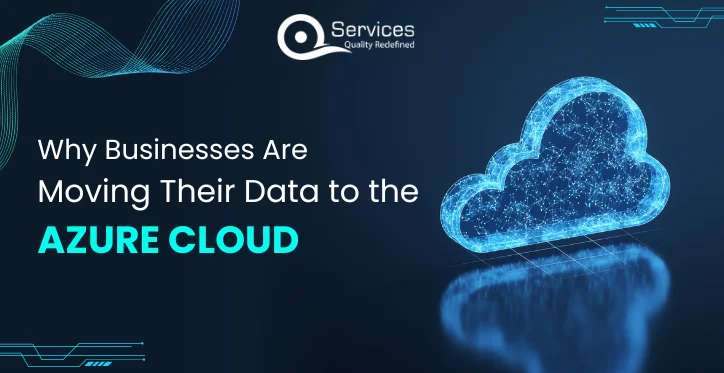Home » Why Businesses Are Moving Their Data to the Azure Cloud?

There are several advantages to cloud computing, due to which businesses have been moving a large percentage of their operations to the Azure Cloud in recent years. The main reason for this Azure cloud migration is Azure’s exceptional scalability and flexibility. The platform’s capability to flexibly allocate computing resources according to changing needs has become crucial for businesses aiming for an efficient and adaptable infrastructure. This adaptability allows companies to manage varying workloads with ease, scaling resources up during high demand and down during slower periods. By leveraging Azure’s cloud services, businesses can benefit from a pay-as-you-go model that reduces costs while offering a broad range of computing capabilities, thereby alleviating the challenges of managing physical hardware.
Cloud computing is defined as a method of delivering computing as a service rather than a product. It is mostly reliant on Internet-based resources. It eliminates the need to manage programs and services on local servers or personal devices by providing hardware on demand, including servers, storage, and hosting services. In the wide world of cloud computing, Microsoft Azure is a well-known player with a feature-rich and flexible cloud platform. Microsoft Cloud Computing offers on-demand computing and storage resources for web application hosting, scalability, and administration over the Internet. It also functions as an environment for development, hosting, data storage, and service management. This aligns with the broader concept of cloud computing, where Microsoft Azure serves as a specific implementation, providing users with the tools to build and manage enterprise-level applications seamlessly and integrating public cloud applications with existing IT environments.
Azure Cloud Services offers a wide array of services and components designed to meet diverse business needs. These components are compatible with different service models and provide businesses with a comprehensive range of resources and tools. The key elements of Azure Cloud Services are organized according to the service models they correspond with:
A key component of the infrastructure-as-a-Service (IaaS) architecture, Azure Virtual Machines (VMs) provide unmatched scalability and flexibility in cloud computing. These virtual machines (VMs) offer on-demand access to computing resources, they enable enterprises to implement a wide range of applications, regardless of their complexity or platform. Businesses can select from a wide variety of virtual machine (VM) sizes and configurations, which provides optimal performance for different workloads. Users can gain control of their virtualized environments and take advantage of features like cost-effectiveness, security, and high availability by utilizing Azure VMs.
This is a recognized Platform-as-a-Service (PaaS) offering, is revolutionizing cloud database management. Microsoft Azure SQL Database is designed for scalability and high performance, with features like geo-replication, intelligent threat detection, and automatic tuning to ensure robust data protection and high availability. It streamlines database operations for enterprises, whether they are developing new applications or migrating existing ones, freeing up resources to focus on optimizing application performance and delivering exceptional value to end users.
An essential element of serverless computing, transforming application development by removing the complexities of infrastructure management. Azure Functions automatically scale in response to triggers, easily handling varying workloads. It supports a wide range of scenarios, from basic event-driven tasks to complex microservice architectures. This serverless solution fosters agility, cost-efficiency, and rapid innovation, making it an ideal choice for modern application development and dynamic workloads.
A vital part of the container orchestration ecosystem that facilitates the deployment, scaling, and management of Kubernetes when used for containerized applications. You can focus on creating and implementing apps instead of worrying about managing the underlying infrastructure by choosing AKS’s fully managed Kubernetes solution. Scaling, automatic upgrades, and integration with Azure Active Directory are just a few of the capabilities that make container orchestration easier with AKS. It simplifies the process of developing scalable and highly available containerized apps and is a fundamental element of Azure’s containerization and microservices strategy.
Get free Consultation and let us know your project idea to turn into an amazing digital product.
These services are a sophisticated suite of machine learning (ML) and artificial intelligence (AI) APIs and services that add intelligent functionality to applications. These services encompass a wide range of capabilities, including computer vision, natural language processing, speech recognition, and decision-making. By leveraging Azure Cognitive Services, organizations can enrich their applications with features such as personalized recommendations, language comprehension, and image recognition.
Azure DevOps, a comprehensive package of development tools and services, can expedite the entire application development lifecycle. In addition to planning and coding, Azure DevOps offers an automated and collaborative environment for testing, deployment, and monitoring. It offers version control systems such as Azure Repos, tools for continuous integration and delivery such as Azure Pipelines, and project management tools such as Azure Boards. Azure DevOps enables a culture of quick product delivery and continuous improvement by fostering collaboration between the development and operations teams.
This is a unified security management system that provides advanced threat protection across all Azure services and on-premises environments. It offers security recommendations to help organizations safeguard their assets. With its advanced features, it empowers organizations to strengthen their security posture. It also facilitates compliance monitoring and provides insights, ensuring a proactive approach to cybersecurity.
Businesses are migrating to Azure Cloud for various reasons, each contributing to the overall benefits and value proposition offered by Microsoft’s cloud computing platform. Here are some key reasons why organizations are opting to migrate to Azure:
Data migration to the cloud facilitates cost-optimized scalability by leveraging the elastic nature of cloud computing resources. Conventional on-premises systems often come with upfront hardware costs, which makes it more difficult to scale up or down in response to changing workloads. On the other hand, pay-as-you-go cloud platforms like Azure enable enterprises to adjust their computer capacity according to demand. Because it eliminates the need for over-provisioning, this on-demand scalability means that organizations only pay for the resources they use, optimizing costs. The ability to instantly change computing capacity as data moves to the cloud becomes a crucial factor in cost effectiveness, allowing businesses to effectively control infrastructure expenses while ensuring they have the right resources available to meet changing business needs.
Implementing an agile development cycle is instrumental in optimizing the cloud migration process, transforming it from a potentially disruptive marathon into a well-structured sprint. Cloud migrations present challenges in terms of time and resource allocation, making the adoption of an agile approach crucial. By breaking down the migration into small, well-defined, and repeatable processes, an agile development cycle allows for iterative learning and acceleration. Each aspect of the migration is tackled in short sprints, enabling rapid issue identification, resolution, and continuous optimization. Following a typical agile cycle, which includes stages like project conception, planning, development and testing, production, and retirement, ensures flexibility and adaptability throughout the cloud migration journey.
This Azure cloud migration accelerates AI and machine learning integration. With prebuilt cognitive services and MLOps pipelines, Microsoft Azure streamlines development and makes it possible for developers to train high-quality models without specialized knowledge. The platform prioritizes enterprise-grade security, privacy, and compliance while ensuring trustworthy AI at every stage of the lifecycle, from data curation to the deployment of transparent algorithms. Azure’s adaptable computing resources remove bottlenecks, offering GPU-rich environments for low-cost testing and boosting enterprise artificial intelligence research.
Azure is a dynamic solution that integrates on-premises and multicloud systems smoothly, addressing the needs of hybrid cloud users. It easily manages servers, Kubernetes clusters, and apps in a variety of environments using a single control plane. Azure’s comprehensive strategy not only promotes ongoing innovation but also helps modernize on-premises infrastructure and brings edge computing capabilities—including artificial intelligence. Azure excels at managing, migrating, and analyzing data with ease because of Arc-enabled data services. This extensive portfolio of services demonstrates Azure’s dedication to providing an adaptable and integrated hybrid cloud solution, enabling businesses to easily navigate a variety of computing environments.
Azure Cloud Migration on the Microsoft Azure platform offers businesses the invaluable advantage of real-time data synchronization through Azure Data Explorer. This fully managed analytics service enables real-time analysis of extensive data streams from applications, IoT devices, and more. With low-latency ingestion, it elastically scales to terabytes of data, supporting fast queries and high concurrency. Azure Data Explorer is optimized for streaming data, facilitating immediate access to up-to-date information, enhancing decision-making, and improving operational efficiency. Its cost-effective structure ensures businesses can activate the value in their data faster, focusing on insights rather than infrastructure. The service’s versatility extends to IoT applications, big data logging platforms, and SaaS applications, making it a comprehensive solution for diverse business needs.
Microsoft Azure uses innovative data security techniques to ensure that organizations operate in a safe and legal cloud environment. Azure uses multi-layered protection, encryption, and threat detection systems in addition to its extensive variety of security capabilities to protect sensitive data. Azure facilitates the early detection and reduction of security threats with its sophisticated threat intelligence and analytics. Because of the platform’s dedication to data residency and sovereignty, organizations can more effectively comply with regulations by having ownership over their data. Businesses can use Azure for their cloud needs with confidence because of our all-inclusive security and compliance approach, which upholds the highest standards of data protection.
Azure Cloud ensures data integrity across locations worldwide with its strong data security features, which include encryption, snapshots, and replication. This additional security layer protects against device malfunctions, cyberattacks, and natural calamities. Azure Site Recovery gives you command over data replication procedures, enabling you to tailor them to your specific business requirements. Additionally, Azure’s flexible features, which support a variety of languages and frameworks, let businesses create, launch, and maintain apps with ease. Features like Active Directory synchronization keep user accounts, groups, and permissions up to date. For businesses using Azure Cloud, this extensive package of services helps with effective data management, application development, and security.
Microsoft Azure Cloud brings significant benefits to businesses through seamless DevOps integration and collaboration. The platform provides robust tools and services that streamline the entire DevOps lifecycle, enabling efficient collaboration between development and operations teams. Azure DevOps Services offer a comprehensive set of features for version control, continuous integration, delivery pipelines, and automated testing. With Azure Boards, teams can plan, track, and discuss work across the development process. Azure Repos allows for centralized version control, while Azure Pipelines automates build and release processes. The integration of Azure Artifacts facilitates package management. Azure’s support for diverse programming languages and frameworks ensures flexibility, and Azure Monitor and Application Insights enable real-time monitoring and performance analysis.
The benefits of migrating to the Azure Cloud are numerous, from increased scalability and reduced expenses to better company performance. However, effective implementation is essential to the success of cloud migration. Businesses face difficulties when they lack skilled employees and experience, especially when current staff aren’t necessarily equipped with the skills needed for a smooth transfer. It’s best to get support from an Azure cloud migration service provider, such as the Azure Database Migration Service, to overcome these obstacles. For a migration to be effective, evaluating your network condition and organizing the change are essential tasks. If you’re considering moving to the cloud, our experts can assist you in comprehending, assessing, and carrying out the procedure successfully. For a seamless and effective migration to the Azure Cloud, utilize our Azure Database Migration Service.

Content writer

Founder and CEO

Chief Sales Officer
